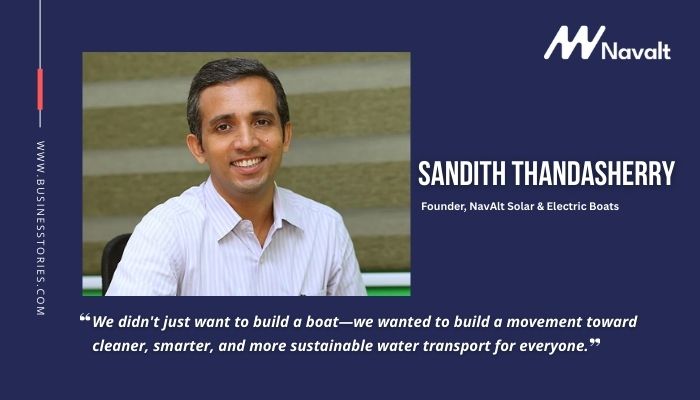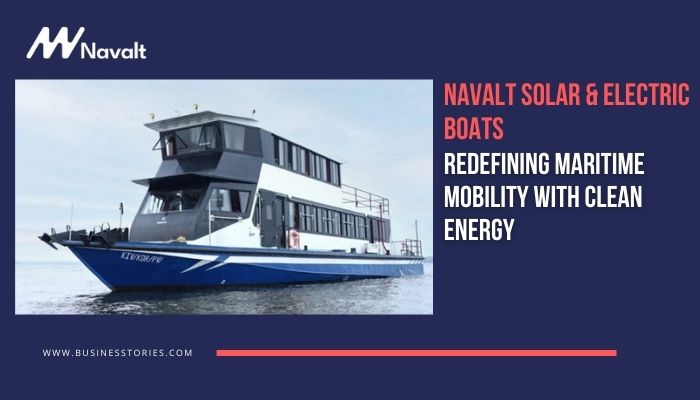In a world where energy efficiency and sustainability have become urgent priorities, the maritime industry remains one of the most challenging sectors to decarbonize. Shipping and water transport account for a significant share of global carbon emissions and air pollution. Against this backdrop, NavAlt Solar & Electric Boats, an innovative startup from India, has emerged as a pioneer in designing clean, affordable, and energy-efficient alternatives to traditional diesel transport. A dream to build the world’s first commercially viable solar-powered passenger ferry has grown into a movement that is transforming urban waterways, rural connectivity, and coastal livelihoods.
This story takes you inside the journey of NavAlt—its founding mission, groundbreaking innovations, challenges faced, and how it is shaping the future of green transport in India and worldwide.
Founding Vision: A Sustainable Dream
NavAlt was founded in 2013 by technology entrepreneur Sandith Thandasherry, a naval architect passionate about cutting-edge advanced technology with sustainability. Born and raised in Kerala, a state interlaced with tranquil backwaters, Sandith grew up witnessing how ferries form the lifeblood of community transport. However, those same ferries emitted thick diesel fumes, consumed vast amounts of fuel, and caused both air and water pollution—an environmental contradiction for such pristine surroundings.

Determined to challenge this status quo, Sandith envisioned a clean alternative. His idea was to harness the abundant solar energy available in Kerala’s climate and apply it to electric ferry propulsion. Instead of limiting his vision to “experimental green boats,” he was determined to build a commercially feasible solar-electric ferry that could safely and efficiently transport mass passengers, helping to solve environmental problems and save the taxpayer money.
The mission resulted in the launch of NavAlt (Naval Alternative Solutions), a pioneering startup headquartered in Kochi.
Partnerships and Collaborations
The approach of NavAlt was not just to build boats, but to create an entire zero-emission water transport ecosystem. To make the technology robust, NavAlt collaborated with French solar boat experts AltEn Systems and leveraged global expertise in marine design. This cross-border partnership blended European technological precision with Indian manufacturing and engineering cost advantage.
In parallel, NavAlt worked with the Kerala government, research institutions, and transport authorities. By building strong partnerships, the company avoided being “just another boat builder” and established itself as an energy-innovation company dedicated to solving systemic problems.
The Milestone: Aditya – India’s First Solar Ferry
The turning point in NavAlt’s journey came in 2017, with the launch of “Aditya”, India’s first solar-powered ferry boat. Operated by the Kerala State Water Transport Department, Aditya proved to the world that solar ferries are not future concepts—they are commercially viable here and now.
What made Aditya revolutionary was not merely its eco-friendliness but its economic competitiveness. The ferry, which carries 75 passengers across Kochi’s backwaters daily, replaced costly diesel consumption with free solar energy. Over five years, it demonstrated remarkable operational cost savings, reducing lifetime fuel expenses by 80% compared to diesel ferries.
Some highlights of Aditya’s achievements include:
- Transporting thousands of commuters daily with zero fuel costs
- Saving more than 1,00,000 litters of diesel annually
- Winning the prestigious Gussies Electric Boat Award (2020) for “Best Electric Ferry in the World”
- Reducing noise, vibration, and carbon footprint drastically
The ferry’s resounding success proved to operators that sustainability does not require financial sacrifice. Instead, it enhances affordability—making adoption faster.
Scaling Impact: Beyond One Ferry
NavAlt did not stop at Aditya. Building on this success, the company expanded its R&D to develop versatile electric and solar-hybrid boats for various sectors. These include:
- Solar-powered passenger ferries for public transport in inland waterways and islands
- Electric workboats and fishing boats for coastal livelihoods, aiming to reduce the dependence of small fishermen on diesel
- Luxury electric catamarans to serve Kerala’s booming tourism sector sustainably
- Hybrid cargo boats for clean logistics in rivers and ports
By diversifying its portfolio, NavAlt addressed multiple pain points across India’s maritime sector—urban transport, rural mobility, tourism, and fisheries.
Overcoming Challenges
The startup journey was not without challenges. In the early days, NavAlt struggled with skepticism from authorities and financiers, who questioned whether solar ferries could be reliable in India’s climate. Battery costs were high, and the industry lacked a mature supply chain for marine-grade electric propulsion systems.
The team’s persistence paid off when Aditya consistently outperformed expectations—operating flawlessly without breakdowns and demonstrating robust viability. This success silenced critics and opened the doors to new projects.
Another challenge was policy. India’s transport sector had little regulatory framework for electric boats initially. NavAlt worked closely with bodies like the Indian Register of Shipping (IRS) to build acceptance and establish safety protocols for electric watercraft.
Finally, technology adoption required behaviour change. Ferry operators, accustomed to diesel engines, had to be reassured about the simplicity of electric propulsion. NavAlt solved this with training programs and by designing boats that minimized the maintenance complexities.
Economic & Environmental Impact
The numbers tell a powerful story of NavAlt’s impact:
- Fuel Savings: Each solar ferry saves up to ₹20 lakh annually on diesel.
- Carbon Footprint: A single vessel prevents over 70 tons of CO₂ emissions per year.
- Maintenance: Electric boats slash maintenance costs by up to 50% since they have fewer moving parts than diesel engines.
- Jobs & Innovation: The company supports green jobs in boatbuilding, electrical systems, and renewable energy integration.
For passengers, the benefits are equally compelling: silent travel, no diesel fumes, and reliable timetables unaffected by volatile fuel prices.
This alignment of economic sense and ecological responsibility has made NavAlt a lighthouse startup in both sustainability and mobility innovation.
Awards and Global Recognition
NavAlt’s achievements have earned recognition both locally and internationally. Honors include:
- The Gussies Award (2020) for “Most Successful Electric Ferry” globally.
- World Bank and UN accolades for promoting sustainable transport.
- Recognition by India’s Ministry of New and Renewable Energy (MNRE) for contributions to clean mobility.
Perhaps the greatest recognition, however, comes from the commuters of Kerala, who rely on Aditya daily and experience first-hand the difference clean mobility makes in their lives.
The Road Ahead
Looking forward, NavAlt aims to expand across India’s extensive network of rivers and coastal zones. The Inland Waterways Authority of India (IWAI) is increasingly promoting water transit, and NavAlt envisions a fleet of hundreds of solar ferries replacing polluting diesel fleets in urban centers like Kochi, Varanasi, and Kolkata.
Another exciting frontier is fishing boats. India’s 200,000+ diesel fishing vessels not only harm the environment but also trap fishermen in high fuel cost cycles. By offering solar-electric or hybrid fishing boats, NavAlt can transform livelihoods—reducing expenses, protecting the oceans, and making a dent in India’s fossil fuel import bill.
Tourism, as well, stands as a ripe market. As global travelers demand eco-friendly experiences, clean luxury houseboats and electric catamarans can boost Kerala’s sustainable tourism offerings.
In addition, NavAlt is looking at international horizons—collaborating with Indian Ocean and Southeast Asian Island nations where clean ferries can solve both transport and climate challenges.
Why NavAlt Matters
NavAlt Solar & Electric Boats is not just a boat manufacturer. It symbolizes a new era in Indian entrepreneurship—where innovation, sustainability, and profitability converge. In many ways, it reflects the future of Indian startups: solving local problems with global significance using technology aligned with climate goals.
By decarbonizing waterways, NavAlt helps India progress toward its renewable energy targets, while showcasing that green transport can be cheaper, better, and faster to adopt. This story inspires other entrepreneurs, policymakers, and communities to reimagine fossil-heavy industries through the lens of renewable innovation.
Next Story: Atypical Advantage: Transforming Disability into Opportunity
Conclusion
From its humble beginnings in Kochi to becoming a global inspiration, NavAlt Solar & Electric Boats embodies the spirit of sustainable disruption. Its success with Aditya proved that solar-powered ferries are not a dream of the future but a practical, scalable solution already at work today.
As cities battle pollution, climate change, and rising fuel costs, NavAlt’s vision of clean and affordable water transport becomes increasingly urgent. It is more than a startup—it is a movement toward regenerating our waterways, empowering communities, and designing a zero-emission tomorrow.
By harnessing India’s abundant sun and the timeless resilience of its backwaters, NavAlt is charting a course—not just for Kerala or India, but for the world—towards a cleaner maritime future.




